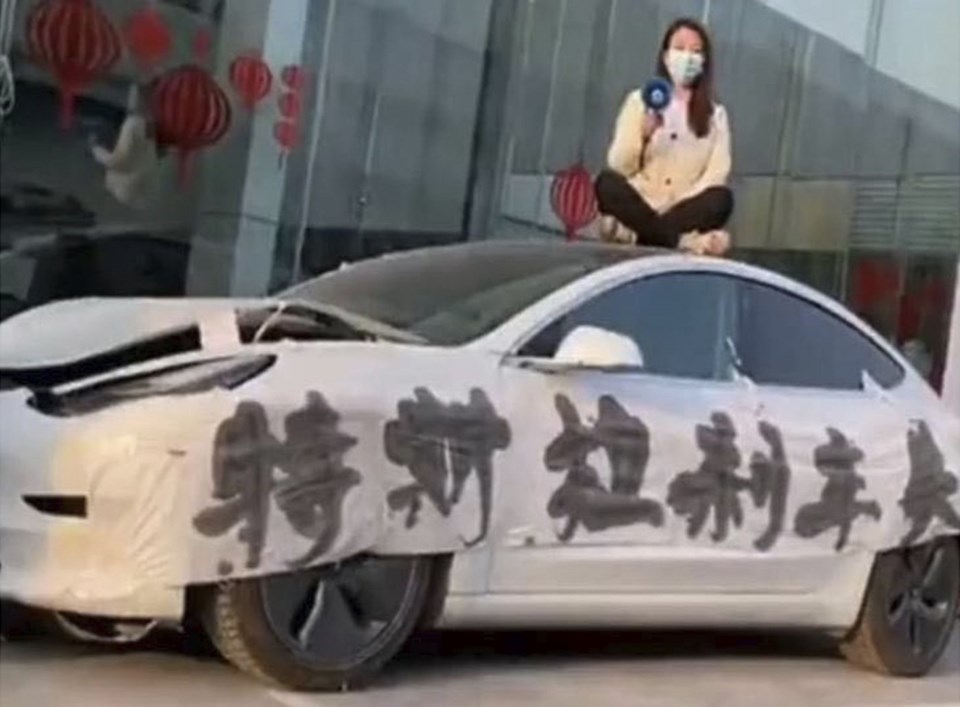BEIJING (AP) ā Tesla has embraced to stifle its critics ā suing its own customers.
Thatās left some Tesla owners desperate. Zhang Yazhou protested publicly that her Model 3's brakes had failed and caused an accident in 2021 that sent her parents to the hospital. Tesla said that wasnāt true and sued her for defamation. A Chinese court ordered Zhang to pay the $1.1-trillion company more than $23,000 in damages and publicly apologize for her criticism.
āI refuse to accept it,ā said Zhang, who appealed the verdict. āAs a consumer, even if I said something wrong, I have the right to comment and criticize. I spoke about my feelings as a user of the car. It has nothing to do with damaging their reputation.ā
As ., Teslaās record in China shows how it has thrived in a system where regulators, the courts and media all answer to the ruling Communist Party.
Itās not common for automakers ā in China or elsewhere -- to sue their own customers. But Tesla has done so successfully in China, where Elon Musk's company has used the courts and the patronage of a powerful leader to silence critics, reap financial rewards and limit its accountability.
Tesla did not return requests for comment. Here are some key things to know about Tesla's success in China:
Musk has a powerful patron in China
Teslaās commercial and political success in China has hinged on the support of a powerful patron: Li Qiang, the former party boss of Shanghai who is now Chinaās premier, second in rank only to President Xi Jinping. Tesla built its first overseas factory on the outskirts of Chinaās financial capital under his watch in 2019.
With Liās support, Tesla was the first foreign automaker allowed to retain complete control over its China venture. Tesla got low-interest loans, tax breaks, favorable regulatory changes and other benefits.
In January 2020, Musk unveiled the first Chinese-made Teslas on a stage in Shanghai. That year, Tesla turned an and Musk was soon declared the world's richest person.
Muskās āgreater objective was winning influence over the people that mattered for him, that enabled him to get things done,ā said Bill Russo, founder of Automobility Ltd., an advisory firm based in Shanghai. āHeās done a good job of it in China, and heās done it now with the influence he purchased with his relationship with Trump.ā
Requests for comment to the State Council, which is run by Li Qiang, went unanswered.
Tesla has had an impressive winning streak in Chinese courts
Over the last four years, Tesla has sued at least six car owners in China who had sudden vehicle malfunctions, quality complaints or accidents they claimed were caused by mechanical failures.
The company has also sued at least six bloggers and two Chinese media outlets that wrote critically about the company, according to a review of public court documents and Chinese media reports by The Associated Press.
Tesla won all eleven cases for which AP could determine the verdicts. Two judgments are on appeal. One case was settled out of court.
Tesla has not only won the defamation cases it brought against unhappy car owners and critical journalists, it has also prevailed in lawsuits customers have filed against it.
An AP review of a Chinese government database of court filings published online found 81 civil judgments in which car owners sued Tesla over safety and quality issues or contract disputes. Car owners won in only nine of those cases.
While some industry experts say itās generally difficult for customers to win such cases, others say itās remarkable for a foreign company to enjoy such blazing success in Chinese courts.
āFor Tesla to win that percentage of the time is an anomaly,ā said Russo, who also used to be regional head of Chrysler in northeast Asia. āThe odds are stacked against you. Itās like going to the casino and winning every hand.ā
In a statement to AP, the Shanghai High Peopleās Court said that judgements are the result of a āfair trial."
āIt cannot be assumed that the party has received āspecial protectionā or āspecial treatmentā because of their victory,ā the court wrote.
Media coverage of Tesla in China is constrained
Two Chinese journalists based in Shanghai told AP there is an unwritten rule to avoid critical coverage of Tesla. Both spoke on condition of anonymity, fearing retaliation.
āWe were told by our editor that we should not write negatively about Tesla because it is a key company that was introduced and protected by the Shanghai government,ā a tech reporter told AP.
Those who have strayed have found themselves in court. Muskās company sued media outlets PingWest and ifeng.com over negative coverage. PingWest had to apologize for a report that claimed Teslaās Shanghai factory was a āsweatshopā and pay Tesla 100,000 yuan ($13,700). The AP could not determine the outcome of the case against ifeng.com, which drew Teslaās ire after writing about the tribulations of car owners who fought Tesla.
Electric vehicle giant BYD has also aggressively pursued media in court, including an unsuccessful lawsuit against Vice Media in the United States. More recently, electric vehicle makers Nio and Li Auto have stepped up defamation cases against bloggers in China who allegedly spread false information about their companies.
Tesla, however, stands out even among its cut-throat Chinese competitors ā in going after car owners who suffered crashes.
āTesla used their legal advantages to bully Chinese car owners and people who speak up for them,ā said Feng Shiming, an auto blogger and Tesla owner who was ordered by a Shanghai court last year to pay Tesla 250,000 yuan ($34,000) after he wrote about Teslaās alleged brake failures. āTesla wants to have a chilling effect on society and terrify people so they will be scared to say anything negative about Tesla.ā
___
Chen and Kinetz reported from Washington.
___
Contact APās global investigative team at [email protected] or
Elsie Chen, Erika Kinetz And Dake Kang, The Associated Press



